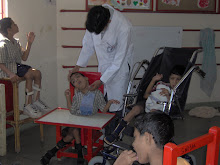You can
- Leave a post below and we'll answer your post online
- Mail us, and we'll send you an answer in 48 hours.
So don't hesitate, contact us now.
Email: sharatpani@hotmail.com
Phone: +919886374024
"The only disablity in life is a bad attitute"Scott Hamilton
"When no one will walk with you, walk alone, walk alone"
Rabindranath Tagore
"We must be the change we wish to see."Mahatma Gandhi

5 comments:
Dear Dr.
I know my question is irrelevant to special care dentistry, but I didnt find another page i can trust.
I have been seeing some people lately using baking soda as a toothpaste, and some use it with peroxide. is that good for the teeth and the gum?
thank you for the great blog
dear dr.
Thank you for the great blog. My question is not related to specal care dentistry but i couldnt find another place where i can get a proffessional opinion.
I have bee seeing a lot of people using baking soda as a toothpaste, some add peroxide to that. is that safe for the teeth and gum?
thank you
Baking soda or sodium bicarbonate is not a substitute for toothpaste. All toothpastes contain a mild abrasive, usually calcium carbonate or colloidal silica. The use of baking soda acts an abrasive, when mixed with peroxide it produces a bubbling effect which can dislodge some stains and give a sense of "freshness". but it is most definitely not a substitute for a toothpase
Sir,
My name is R. Venkitachalam and I am doing my first year MDS in Public Health Dentistry at Amrita School of Dentistry, Cochin, Kerala. We, staff and postgraduates had recently attended a dental camp at a special school in Cochin. I would like to ask you a few questions the teachers of the school wanted solutions for. Sir, I went through your blog and understood the indepth knowledge you have in the area of treating children with special needs. Kindly give your valuable suggestions for the queries below so that I can get back to them.
Q1) We had visited a ward in the school which houses children with severe Cerebral Palsy and other motor disabilites. The age group of children varied from 6 years to 25 years. The staff reported that these children had the habit of constantly placing their fingers into the oral cavity (not only thumb) which resulted in infection of fingers. Their had tried several restrainers like long sleeved shirts and hand bandages but with little success as the children did not co-operate. They also tried applying solutions to fingers but was still not beneficial. As providing appliances is not feasible for these children, can u suggest a method by which this problem can be controlled ?
Q2) The staff also complained of severe drooling of saliva in children which created difficulties in sharing common items like puzzles and other educational toys. What solution can we offer them other than disinfecting the toys after each use ?
Kindly awaiting your response
Thank you
Dear Dr Venkitachalam, Your question is one that is often on the mind of every professional who works with children with special needs. The answer is not a simple one simply because the needs of each child differs.
a) Regarding the digit sucking; it is a psycho-somatic habit. The efforts to counter this habit will prove to be be ineffective. The best way is to help the care-givers to maintain general hygiene.
b) The Drooling needs to be treated on a case by case basis. the most successful first step is speech therapy. Most of the time, teaching the child to speak improves swallowing patterns and helps to reduce drooling. Appliances and botox may be extremely helpful in some cases, but need to be considered on a case by case basis.
Post a Comment